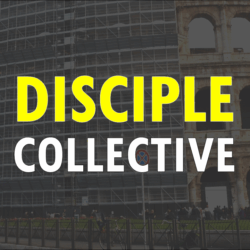This is part seven of a series of posts called Habits of a Disciple.
When we lived in Georgia, Ruth and I visited Creflo Dollar’s church, the World Changer Dome, for a Sunday service. We went to fulfill an assignment for our preaching class to attend a service different from our own tradition and write a report about it. We parked far away from the large building. So many thousands of people were attending that the police directed traffic. As we got out of the car and followed the crowds to the facility, I remember how much it felt like a sporting event with people streaming in from every direction. As we entered one of the many front doors we found ourselves in a spacious foyer where greeters welcomed us. As we approached the inner doorways to the theatre-style auditorium, an usher handed us tissues. They must have figured that the preaching would be so powerful and stirring that we would need something to wipe away the tears. We walked down to some seats toward the front while the praise team was singing.
I honestly don’t remember very much about the songs or the sermon, but what I do remember was how front and center giving was for Pastor Dollar’s ministry. Throughout the service they gave us three opportunities to give, passing the buckets multiple times and inviting us to the front as well. Like so many “prosperity gospel” ministries, they believed that the more you give, the more God blesses you. The first ten percent of your income is merely what you owe, but what you give beyond that really causes God’s blessings to flow into your life. As a result, they were quite unashamed about the whole process, even providing envelopes with space on the back to write in your credit card information.
I remember how uncomfortable I felt with this whole situation. Some of my angst was probably due to the fact that I was studying to become a pastor and knew that some people would end up painting me with the same brush as Dollar. I also couldn’t help but think over the many examples of poor saints throughout scripture. (Jesus himself lived near the poverty line along with the majority of Jewish peasants in the first century not to mention many of the Old Testament prophets.) However, what really stood out to me was the fantastic wealth gap between Dollar and those who came to his church. One of them went to school with me and she was very poor. However, Dollar had a Rolls Royce and a private jet. (Recently he upgraded to a $65 million Gulfstream G650, causing a media frenzy.) The whole experience left me befuddled and disappointed.
In contrast to what I saw in Atlanta, the bible does not teach that giving to God is a way to get rich. In fact it says we should be content with food and clothing rather than chasing after wealth (1 Tim 6.8-9). “For the love of money is a root of all kinds of evils” (1 Tim 6.10). However, the bible does teach that God will take care of our needs as we give (2 Cor 9.8-11). But, before we take a look at the benefits of giving, let’s step back and consider some background. Under the old covenant we see a few different types of giving, including animal, grain, and wine sacrifices offered to God, giving to the poor both directly and through gleaning, and giving to support the priests. In the new covenant, now that Christ is the final sacrifice, we only see the last two practices going forward: giving to the poor (Luke 16; Mat 25) and supporting ministers (1 Cor 9.7-14).
Beyond this, the bible also tells us how God wants us to give. We find at least four major instructions about how we should do this. First of all, consider these words from our Lord:
Matthew 6.1-4
1 Beware of practicing your righteousness before other people in order to be seen by them, for then you will have no reward from your Father who is in heaven. 2 Thus, when you give to the needy, sound no trumpet before you, as the hypocrites do in the synagogues and in the streets, that they may be praised by others. Truly, I say to you, they have received their reward. 3 But when you give to the needy, do not let your left hand know what your right hand is doing, 4 so that your giving may be in secret. And your Father who sees in secret will reward you.
From Jesus we learn some crucial instruction on how to give. We should not brag or announce our giving. Contrast this to the world’s public relations stunt of making a huge check so that everyone can see the amount and the organization that gave it. Jesus says we shouldn’t even let our left hand know what our right hand is doing. Obviously, this is an exaggeration, since both hands are connected to the same head, but the point is clear: we should give discreetly. If we give in secret then God will see it and reward us, but if not then the accolades of those we are trying to impress are all the reward we should expect.
A second key the bible teaches about giving is that we should do it cheerfully, not begrudgingly or under compulsion; “God loves a cheerful giver” (2 Cor 9.7). We aren’t to give until it hurts, but we should give generously as we are able. Thirdly, we should give in proportion to what we have. Paul advised the Corinthians thus:
1 Corinthians 16.2
On the first day of every week, each of you is to put something aside and store it up, as he may prosper, so that there will be no collecting when I come.
He knew he would come to them to take up a collection for the needy in Jerusalem. He didn’t want to surprise or overwhelm them. He wanted them to plan ahead so everything would be smooth and easy when he got there. He doesn’t want to pressure them into giving; rather he wants them to think it through before he gets there. Furthermore, we see here how each should give “as he may prosper.” He did not specify a minimum, but encouraged them to give proportionally.
Beyond these ways of giving, the scriptures also provide a couple of benefits of giving. Here is an important text to consider:
2 Corinthians 9.7-14
7 Each one must give as he has decided in his heart, not reluctantly or under compulsion, for God loves a cheerful giver. 8 And God is able to make all grace abound to you, so that having all sufficiency in all things at all times, you may abound in every good work. 9 As it is written, “He has distributed freely, he has given to the poor; his righteousness endures forever.” 10 He who supplies seed to the sower and bread for food will supply and multiply your seed for sowing and increase the harvest of your righteousness. 11 You will be enriched in every way to be generous in every way, which through us will produce thanksgiving to God. 12 For the ministry of this service is not only supplying the needs of the saints but is also overflowing in many thanksgivings to God. 13 By their approval of this service, they will glorify God because of your submission that comes from your confession of the gospel of Christ, and the generosity of your contribution for them and for all others, 14 while they long for you and pray for you, because of the surpassing grace of God upon you.
Here we learn God will bless the giver so that he or she has sufficiency in all things (cp. Luke 6.38). In addition, their giving produces thanksgiving among the needy, which, in turn, ultimately bringing glory to God. Lastly, the recipients will long for them and pray for them because of their generosity. Those are some serious benefits! It’s no wonder Jesus said, “It is more blessed to give than to receive” (Acts 20.35).
Before concluding, I want to make sure to mention one last though extremely important aspect to giving: trust. We cannot give if we don’t trust that God is going to take care of us. Jesus taught us that we should not spend our time worrying about tomorrow—what to eat, what to drink, or what to wear. God takes care of the birds of the air and the lilies of the field. The nations all fuss about such matters, but God’s people are different. Instead of seeking after how we can amass possessions here, we seek first the kingdom of God and his righteousness and then God will add these other things to us as well (Mat 6.25-33). This is the great key that can free us from a great deal of our anxiety. We put God and his kingdom and doing what he says first; then we trust him that he’ll work out the rest. Giving can be a great way to cut through our materialism, covetousness, and greed so that we can become free to worship God and serve his people.
This concludes the series “Habits of a Disciple.” To read the whole series, click here.







Giving in secret draws a Christian closer to God and Jesus Christ, and brings us joy and contentment.